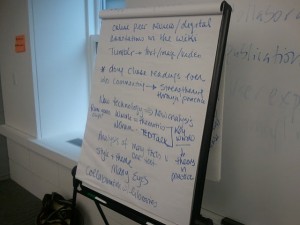Osita Nwanevu reviews Barack Obama’s new book in The New Republic…
If he ever conceded so, Obama would likely insist nevertheless that the truth doesn’t matter nearly as much as maintaining faith in the American project. “I’m not yet ready to abandon the possibility of America,” Obama writes in another excerpt published in The Atlantic, “not just for the sake of future generations of Americans but for all of humankind.” But he clearly understands, too, as Biden surely does on some level, that our situation is bleak. “I’m convinced that the pandemic we’re currently living through is both a manifestation of and a mere interruption in the relentless march toward an interconnected world, one in which peoples and cultures can’t help but collide,” he writes. “In that world—of global supply chains, instantaneous capital transfers, social media, transnational terrorist networks, climate change, mass migration, and ever-increasing complexity—we will learn to live together, cooperate with one another, and recognize the dignity of others, or we will perish.” It’s a passage far less inspirational than it is chilling—evidence that as determinedly as he might disparage cynicism, Obama knows exactly what horrors await us in the years to come and that the curmudgeons and cranks on the left are, again, substantively correct about the trajectory we’re on.
Sanjana Varghese on surveillance culture and COVID in Real Life Magazine…
But this collection and operationalization of biometric data — at the border, at the entrance to an office, on the floor of a warehouse — is not some neutral means for assessing the risk a given individual poses, with respect to Covid-19 or any other hazard, any more than biometric data in general simply represents the reality or perceived reality of someone’s identity. Such biometric forms of control replicate already existing biases about who must bear the brunt of surveillance technologies, marking out particular populations for more intensive scrutiny. This was true when concerns about terrorism after 9/11 led to the sorting of foreign workers, immigrants, asylum seekers, and noncitizens into “desirable” and “undesirable” categories, as David Lyon explains in Surveillance, Power and Everyday Life. It was also true with predictive-policing algorithms, which, as Ruha Benjamin and Simone Browne have intensively catalogued, were first deployed against Black populations.
Stuart Schrader on defunding the police around the world in N Plus One Magazine…
The great myth that underpins policing in the United States is that it remains a purely local affair, with police responding to the safety needs of individual neighborhoods. Setting aside the numerous federal law enforcement agencies, the grants to municipalities from the Departments of Justice and Homeland Security, and the nationwide professional and fraternal organizations that cops belong to, what unifies police in the United States today is their global reach. It is common today to hear criticisms of the militarization of US policing. But beneath this trend is a much-older process that has ebbed and flowed over time: the globalization of US policing.
Shawn Gude on Eugene Debs for Jacobin Magazine…
Debs’s approach to the “popularity question” differs from one of his ideological heirs, Bernie Sanders. After languishing in minor party obscurity through the 1970s, Sanders dropped the most radical planks of his platform (including socializing the economy’s commanding heights) and gained political office by pursuing policies thwarted not by lack of popularity but by the plutocratic order. Often, his goal has been less to gainsay prevailing opinion — though he’s done plenty of that, too — than to press for public sentiment to be reflected in public policy. Popular social democratic reforms like taxing the rich, funding public programs, and boosting worker power are his bread and butter.
Melissa Gira Grant on the girlboss feminism of the Biden cabinet in The New Republic…
If your political aspirations are mainly about getting a seat at the table, these appointments may feel worth lauding. But they are in many ways symbolic gains, a point that even some of those who celebrate such symbolism can accept. Their takeaway is that girls will see these women in these jobs and realize “they can do that, too”—not that they will also have the means to do it or that it will necessarily improve many other women’s lives. It’s a regression to the kind of individualistic, girlboss feminism we have been trying to pull away from but that still has a powerful hold on those who posit a commitment to “gender equality” largely confined to who holds the power, not what they do with it.
